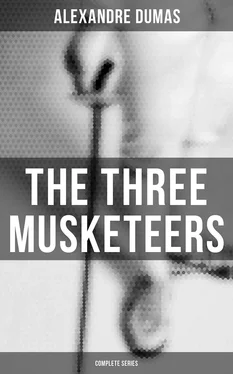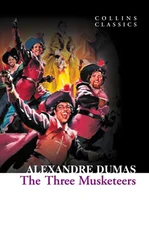M. Coquenard entered, pushed along upon his armchair with casters by Mme. Coquenard, whom Porthos assisted in rolling her husband up to the table. He had scarcely entered when he began to agitate his nose and his jaws after the example of his clerks.
“Oh, oh!” said he; “here is a soup which is rather inviting.”
“What the devil can they smell so extraordinary in this soup?” said Porthos, at the sight of a pale liquid, abundant but entirely free from meat, on the surface of which a few crusts swam about as rare as the islands of an archipelago.
Mme. Coquenard smiled, and upon a sign from her everyone eagerly took his seat.
M. Coquenard was served first, then Porthos. Afterward Mme. Coquenard filled her own plate, and distributed the crusts without soup to the impatient clerks. At this moment the door of the dining room unclosed with a creak, and Porthos perceived through the half-open flap the little clerk who, not being allowed to take part in the feast, ate his dry bread in the passage with the double odor of the dining room and kitchen.
After the soup the maid brought a boiled fowl—a piece of magnificence which caused the eyes of the diners to dilate in such a manner that they seemed ready to burst.
“One may see that you love your family, Madame Coquenard,” said the procurator, with a smile that was almost tragic. “You are certainly treating your cousin very handsomely!”
The poor fowl was thin, and covered with one of those thick, bristly skins through which the teeth cannot penetrate with all their efforts. The fowl must have been sought for a long time on the perch, to which it had retired to die of old age.
“The devil!” thought Porthos, “this is poor work. I respect old age, but I don’t much like it boiled or roasted.”
And he looked round to see if anybody partook of his opinion; but on the contrary, he saw nothing but eager eyes which were devouring, in anticipation, that sublime fowl which was the object of his contempt.
Mme. Coquenard drew the dish toward her, skillfully detached the two great black feet, which she placed upon her husband’s plate, cut off the neck, which with the head she put on one side for herself, raised the wing for Porthos, and then returned the bird otherwise intact to the servant who had brought it in, who disappeared with it before the Musketeer had time to examine the variations which disappointment produces upon faces, according to the characters and temperaments of those who experience it.
In the place of the fowl a dish of haricot beans made its appearance—an enormous dish in which some bones of mutton that at first sight one might have believed to have some meat on them pretended to show themselves.
But the clerks were not the dupes of this deceit, and their lugubrious looks settled down into resigned countenances.
Mme. Coquenard distributed this dish to the young men with the moderation of a good housewife.
The time for wine came. M. Coquenard poured from a very small stone bottle the third of a glass for each of the young men, served himself in about the same proportion, and passed the bottle to Porthos and Mme. Coquenard.
The young men filled up their third of a glass with water; then, when they had drunk half the glass, they filled it up again, and continued to do so. This brought them, by the end of the repast, to swallowing a drink which from the color of the ruby had passed to that of a pale topaz.
Porthos ate his wing of the fowl timidly, and shuddered when he felt the knee of the procurator’s wife under the table, as it came in search of his. He also drank half a glass of this sparingly served wine, and found it to be nothing but that horrible Montreuil—the terror of all expert palates.
M. Coquenard saw him swallowing this wine undiluted, and sighed deeply.
“Will you eat any of these beans, Cousin Porthos?” said Mme. Coquenard, in that tone which says, “Take my advice, don’t touch them.”
“Devil take me if I taste one of them!” murmured Porthos to himself, and then said aloud, “Thank you, my cousin, I am no longer hungry.”
There was silence. Porthos could hardly keep his countenance.
The procurator repeated several times, “Ah, Madame Coquenard! Accept my compliments; your dinner has been a real feast. Lord, how I have eaten!”
M. Coquenard had eaten his soup, the black feet of the fowl, and the only mutton bone on which there was the least appearance of meat.
Porthos fancied they were mystifying him, and began to curl his mustache and knit his eyebrows; but the knee of Mme. Coquenard gently advised him to be patient.
This silence and this interruption in serving, which were unintelligible to Porthos, had, on the contrary, a terrible meaning for the clerks. Upon a look from the procurator, accompanied by a smile from Mme. Coquenard, they arose slowly from the table, folded their napkins more slowly still, bowed, and retired.
“Go, young men! go and promote digestion by working,” said the procurator, gravely.
The clerks gone, Mme. Coquenard rose and took from a buffet a piece of cheese, some preserved quinces, and a cake which she had herself made of almonds and honey.
M. Coquenard knit his eyebrows because there were too many good things. Porthos bit his lips because he saw not the wherewithal to dine. He looked to see if the dish of beans was still there; the dish of beans had disappeared.
“A positive feast!” cried M. Coquenard, turning about in his chair, “a real feast, EPULCE EPULORUM. Lucullus dines with Lucullus.”
Porthos looked at the bottle, which was near him, and hoped that with wine, bread, and cheese, he might make a dinner; but wine was wanting, the bottle was empty. M. and Mme. Coquenard did not seem to observe it.
“This is fine!” said Porthos to himself; “I am prettily caught!”
He passed his tongue over a spoonful of preserves, and stuck his teeth into the sticky pastry of Mme. Coquenard.
“Now,” said he, “the sacrifice is consummated! Ah! if I had not the hope of peeping with Madame Coquenard into her husband’s chest!”
M. Coquenard, after the luxuries of such a repast, which he called an excess, felt the want of a siesta. Porthos began to hope that the thing would take place at the present sitting, and in that same locality; but the procurator would listen to nothing, he would be taken to his room, and was not satisfied till he was close to his chest, upon the edge of which, for still greater precaution, he placed his feet.
The procurator’s wife took Porthos into an adjoining room, and they began to lay the basis of a reconciliation.
“You can come and dine three times a week,” said Mme. Coquenard.
“Thanks, madame!” said Porthos, “but I don’t like to abuse your kindness; besides, I must think of my outfit!”
“That’s true,” said the procurator’s wife, groaning, “that unfortunate outfit!”
“Alas, yes,” said Porthos, “it is so.”
“But of what, then, does the equipment of your company consist, Monsieur Porthos?”
“Oh, of many things!” said Porthos. “The Musketeers are, as you know, picked soldiers, and they require many things useless to the Guardsmen or the Swiss.”
“But yet, detail them to me.”
“Why, they may amount to—”, said Porthos, who preferred discussing the total to taking them one by one.
The procurator’s wife waited tremblingly.
“To how much?” said she. “I hope it does not exceed—” She stopped; speech failed her.
“Oh, no,” said Porthos, “it does not exceed two thousand five hundred livres! I even think that with economy I could manage it with two thousand livres.”
Читать дальше












